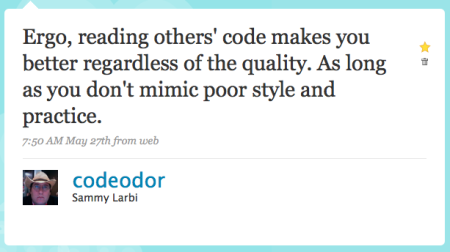Programmers are fond of telling each other that you can
be a better programmer by reading other people's code.
It's a
common bit of advice.
I get the impression most people think
you get better by imitating masters.
It's a common theme in self improvement.
Aspiring writers read great authors. Aspiring musicians listen to great musicians. Artists study artists and coders
study coders.
I've certainly espoused that point of view. I'm fond of quoting Ron Jeffries as saying,
My advice is to do it by the book, get good at the practices, then do as you will. Many people want to skip to step three. How do they know?
In fact, I think that's the third time I've done so in almost as many years.
But what if that's not the primary benefit of reading other people's code? I don't mean scanning it - I mean reading it
until you understand exactly what it's doing. Is there something else you can get out of it?
I think so. Perhaps it's not the mimicking of a particular style like a monkey that makes us better
for reading code. What if it's tracing through an unfamiliar thought process that flexes the brain
and makes it think in ways it previously had not?
By reading unfamiliar code and forcing yourself to trace through until you understand it, you end up
thinking in ways that were previously foreign to you.

I think that's where the real value in reading code exists.
What are your thoughts?
Hey! Why don't you make your life easier and subscribe to the full post
or short blurb RSS feed? I'm so confident you'll love my smelly pasta plate
wisdom that I'm offering a no-strings-attached, lifetime money back guarantee!
Leave a comment
There are no comments for this entry yet.
Leave a comment